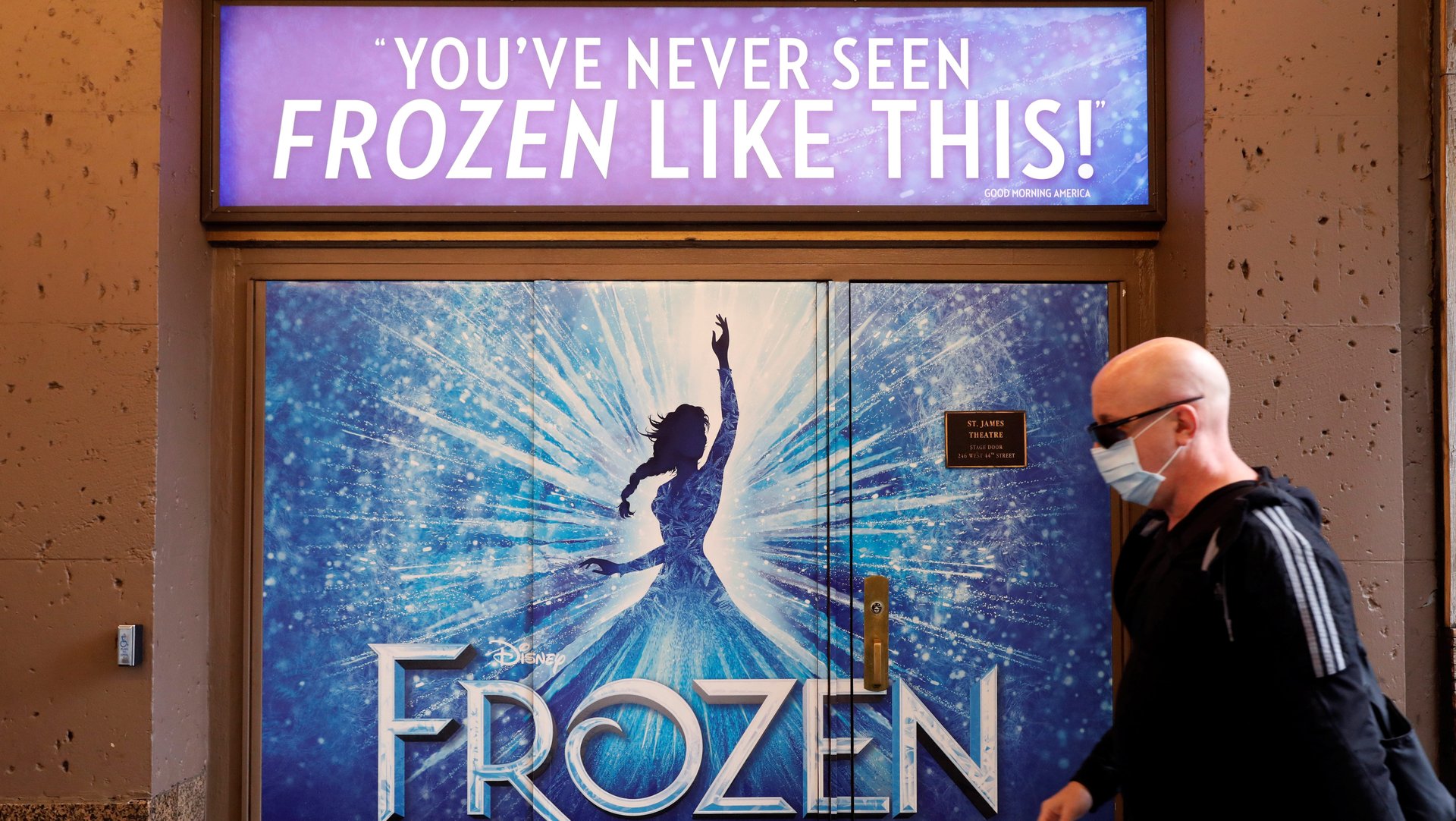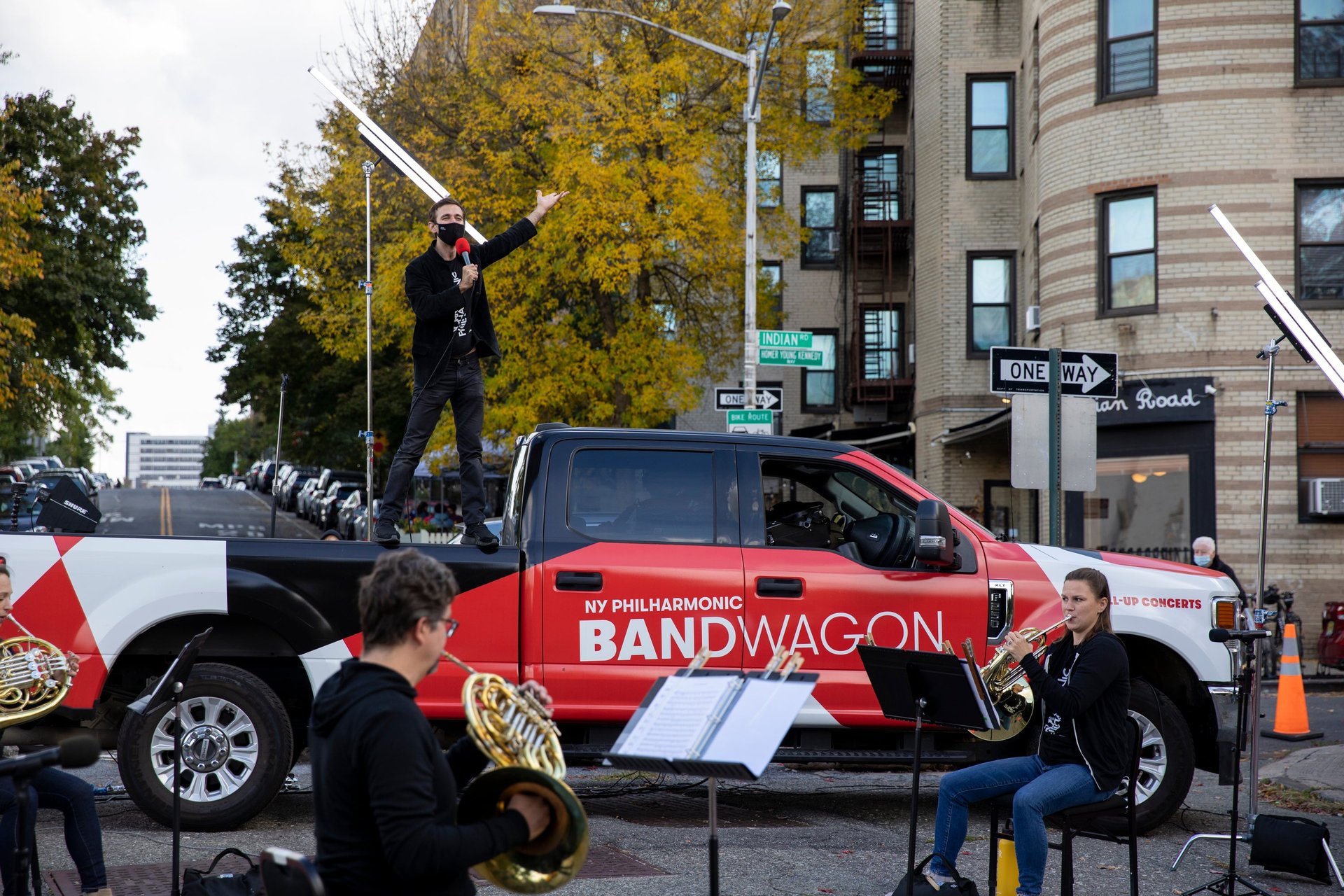Inside the six-month experiment to revive New York’s performing arts scene
This weekend marks a key milestone in reigniting performing arts across New York state.


This weekend marks a key milestone in reigniting performing arts across New York state.
Today (Feb 20), the first of a series of 1,000 live performances kicks off a six-month festival called NY PopsUp. In essence, NYPops Up is a large-scale experiment in how to safely jumpstart the sector that contributes billions of dollars to the state’s economy each year. While access to indoor venues remain highly restricted, the festival will make stages out of unusual locations such as “transit stations, parks, subway platforms, museums, skate parks, street corners, fire escapes, parking lots, and storefronts,” according to a statement released by New York governor’s office.
The first performance, a traveling concert paying tribute to healthcare workers, will begin at New York City’s Jacob K. Javits Convention Center. The sprawling venue in midtown Manhattan bears special significance during the state’s coronavirus saga. Earlier in the pandemic, it was transformed as a 1,000 bed overflow hospital for Covid-19 patients. It has since been converted to a vaccination distribution center for thousands of New Yorkers.
Veteran Hollywood producers Scott Rudin and Jane Rosenthal are overseeing NYPops Up and stage director Zack Winokur serves as its curator. The festival schedule is yet to be published, but Winokur describes his intention to create a program with “a near limitless range, colliding disparate styles, disciplines, and points-of-view.” Hugh Jackman, Renée Fleming, Amy Schumer, Alec Baldwin, Chris Rock, Matthew Broderick, Sarah Jessica Parker, and Patti Smith have confirmed their participation. NYPops Up’s biggest events will happen in June with Tribeca Film Festival’s twentieth anniversary celebration and the inauguration of a new man-made park along Manhattan’s west side called Little Island at Pier 55. Most events will be free to the public and streamed online.
“We think of NY PopsUp as a bridge that will take New York state’s performing arts industry from its current shutdown to a full reopening,” says Rick Miramontez, a spokesperson for NY PopsUp.
Last March, New York immediately closed Broadway theaters, concert halls, sports stadiums, and museums upon learning how quickly the virus spreads in indoor venues. A Brookings Institute report suggests that shutting down New York’s arts sector has resulted in 280,000 job layoffs and $26.8 billion in lost sales.
Reopening these large entertainment venues is a priority, explained New York governor Andrew Cuomo. In a Feb 8 press conference, he cited a recent Buffalo Bills game where 6,800 fans were allowed into the football team’s 72,000 seat stadium, as a template for allowing large crowds at events. It’s a plan that’s proven to be feasible but comes at a lot of coordination and cost. Three days before the Jan. 9 playoff game against the Indianapolis Colts, the team administered 5,000 Covid-19 tests in the stadium’s parking lot and tacked a $63 surcharge to the ticket price to cover the cost of the exam.
Bursts of live performances during the pandemic
Live performances didn’t complete cease during the long, dispiriting months of lockdown. In fits and starts, artists of all caliber organized free outdoor concerts in porches, stoops, and parks, across New York.
Opera singer Anthony Roth Costanzo conceived of NY Phil Bandwagon, among the most memorable free live concert series of the pandemic. Following masking and social distancing protocols, the celebrated countertenor and members of the New York Philharmonic used the flatbed of a pick-up truck as a stage and performed in neighborhoods across New York City’s five boroughs. Costanzo, who is performing at NYPops Up inaugural concert at the Javits Center, says that the experience gave him the chance to witness how art matters to audiences, especially in times of great distress.
“We can sometimes forget about how are lives are made more meaningful by interacting with beauty,” he says. “I’m grateful for the streaming technologies and all of that but seeing it live and the feeling a sense of community is irreplaceable.”

“As musicians, we’re usually in a big, dark theater where we don’t get to see the faces of the people we perform for,” says Costanzo. “To have that kind of dialogue expands our points of reference as artists.” Costanzo, for one, is excited for the experimental nature of NYPops Up. He explains that being involved the program allows him to also collaborate with artists he may not encounter in the classical circuit.
Seeing audiences keenly listening to an aria from the 17th century opera Dido and Aeneas during Black Lives Matter protests was a highlight, Costanzo says. “Music is made by composers trying to figure out ways to express things that are too big and too abstract to express in words sometimes,” he explains. “To actually see that take place with people who may not have otherwise been interested in this [genre] felt like a really good representation of that idea.”
Some unanswered questions
Beyond improving their craft, the program will give out-of-work performers a source of income. Though Miramontez declined to get into the details of compensation, he says that every performer participating in NYPops Up will be paid.
It’s a question worth pursuing given that many performers have had to scramble to make ends meet during the pandemic. There are various non-profits who have come forward with assistance programs for out-of-work performers, but the state’s focus has largely been about helping out venues and businesses.
The optimism around NYPopsUp should be tempered with caution, says Ethan Krasnoo, a former actor turned entertainment lawyer. For one, making sure all venues follow health guidelines is crucial. “The state should make sure that the pop-up spaces for performances are inspected for general safety, and should require caps on audience members as each location warrants based on its size. For example, a subway platform should have a smaller cap than a park.”
He says that venues should also figure out a non-discriminatory script for turning away patrons who test positive for Covid-19. “This is unchartered territory,” he says. ”Venues should disclose such requirements at the time of any ticket purchases and be sure to apply the procedure of turning anyone away uniformly in an attempt to avoid claims of discrimination.”